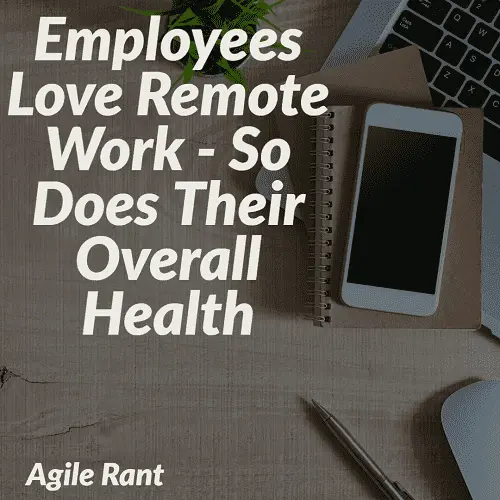Welcome to the future of work – a world where traditional office boundaries are breaking, and the concept of remote work is revolutionizing the way we approach our careers. As the allure of the nine-to-five grind wanes, a new paradigm is emerging, and employees are increasingly gravitating towards the freedom, flexibility, and countless benefits that remote work offers.
In this compelling exploration, we delve into why remote work has captured the hearts and minds of professionals worldwide, unveiling not only its appeal for work-life balance but also the remarkable impact it has on our mental and physical well-being. Join us on this transformative journey, where we uncover how embracing remote work can lead to a healthier, happier, and more fulfilling professional life.
Employees love remote work for various reasons, as it offers several benefits that contribute to job satisfaction and work-life balance. A remote workforce can have benefits like reduced cost of living, flexible work schedule, their own office space, and more. Here are five common reasons why employees enjoy remote work:
Employees Love Remote Work!
Flexibility and Work-Life Balance
Remote working allows employees to have greater control over their schedules, enabling them to better balance work and personal life commitments. They can tailor their work hours to accommodate family needs, personal errands, or other responsibilities, leading to reduced stress and an improved sense of overall well-being. Making work life and home life the best they can be for remote workers.
Commute Elimination From Remote Work
One of the most significant perks of remote working is the elimination of daily commutes. Commuting to and from the office can be time-consuming, tiring, and stressful. With remote work, employees can save valuable time and use it for other activities, such as exercise, hobbies, or spending time with loved ones. Remote workers simply have more time in the day.
Increased Productivity
Many employees find that they are more productive when working from home. The absence of distractions commonly found in a traditional office environment, like constant interruptions or noise, allows them to focus better on their tasks. Additionally, remote workers often have the freedom to create an ideal work environment tailored to their preferences, leading to enhanced concentration and efficiency.
Cost Savings From Remote Work
Remote work can lead to significant cost savings for employees. With no need to commute, they save money on transportation expenses, parking fees, or public transportation fares. Moreover, remote working can also reduce spending on work attire, as there is often more flexibility in dress code when working from home.
Geographic Freedom
Remote working breaks down geographical barriers, allowing employees to work for companies based in different cities, states, or even countries without relocating. This newfound freedom can open up more job opportunities, enabling individuals to find roles that align better with their career goals and interests.
It’s important to note that while remote working offers many advantages, it may not be suitable for everyone or every type of job. Some employees may still prefer the structure and social interactions of a traditional office environment. Employers often find success in adopting a flexible approach that combines both remote work and in-office work options to cater to the diverse preferences and needs of their workforce.
Remote workers can live where they want AND have the job they want!
Remote Work Is Healthy!
Remote work can have a positive impact on employee health and well-being when implemented effectively. Here are five ways in which remote work promotes healthy employees:
Reduced Commuting Stress
Remote working eliminates the need for employees to endure the stress and time-consuming nature of daily commutes. Avoiding traffic jams, crowded public transportation, and long journeys can significantly reduce stress levels, leading to improved mental health and overall well-being.
Which, eliminating that stressful commute means you start the work day on a better and happier note. Your work life is much improved. Remote workers just have less stress.
Use the commute time you’ve now got back to watch an episode of your favorite show Prep dinner at lunch to save you time in the evening Vacuum the living room during a screen break Tell friends and family you can meet them as soon as you’ve finished work, now that you don’t need to commute home first Whether it’s fully remote or hybrid, encouraging the team to find a space that works for them is essential.
Source: bamboohr.com
Enhanced Work-Life Balance
Remote work allows employees to better balance their work and personal lives. With the flexibility to set their schedules, employees can make time for exercise, relaxation, and spending quality time with family and friends. A healthy work-life balance fosters better mental health and prevents burnout.
Medical science has been starting to show the impact of stress on the human body. A better work life balance reduces stress and makes you that much healthier. Remote employees have more control to have the work-life balance they want and need.
Customizable Work Environment
Working from home enables employees to create a personalized and comfortable workspace that suits their needs and preferences. They can adjust lighting, seating, and other elements to reduce physical strain and create an ergonomically-friendly setup. A conducive work environment can contribute to improved focus, productivity, and physical well-being.
Increased Opportunities for Physical Activity
Remote working opens up more opportunities for employees to incorporate physical activity into their daily routines. They can take short breaks to stretch, do quick exercises, or even go for a walk outside during lunch breaks. Encouraging physical activity throughout the day can help combat sedentary behavior and promote a healthier lifestyle.
Reduced Exposure to Illnesses
Remote work can help prevent the spread of contagious illnesses, such as colds and flu, within the workplace. When employees work remotely, there is less chance of coming into contact with sick colleagues, reducing the risk of getting infected and contributing to better overall health.
To fully realize the health benefits of remote work, employers can take proactive measures, such as offering wellness programs, encouraging regular breaks, providing ergonomic equipment, and fostering a supportive and communicative remote working culture.
Additionally, employees should be encouraged to maintain a healthy work-life balance, set clear boundaries between work and personal time, and engage in regular physical activity to support their well-being while working remotely.
When working with remote employees, you must invest in cybersecurity that protects your workers’ and customers’ information.
Source: business.com
Additional Content To Check Out
A great read on how remote work can promote healthiness at home.
In Owl Labs’s report, 70% of remote employees say virtual meetings are less stressful than in-person meetings.
Source: blog.hubspot.com
Telecommute jobs give people who may have a hard time finding steady employment at an onsite job, like those with disabilities or caregivers who need a flexible schedule, the opportunity to follow their career goals without having to worry about commuting back and forth to an office.
Source: flexjobs.com


